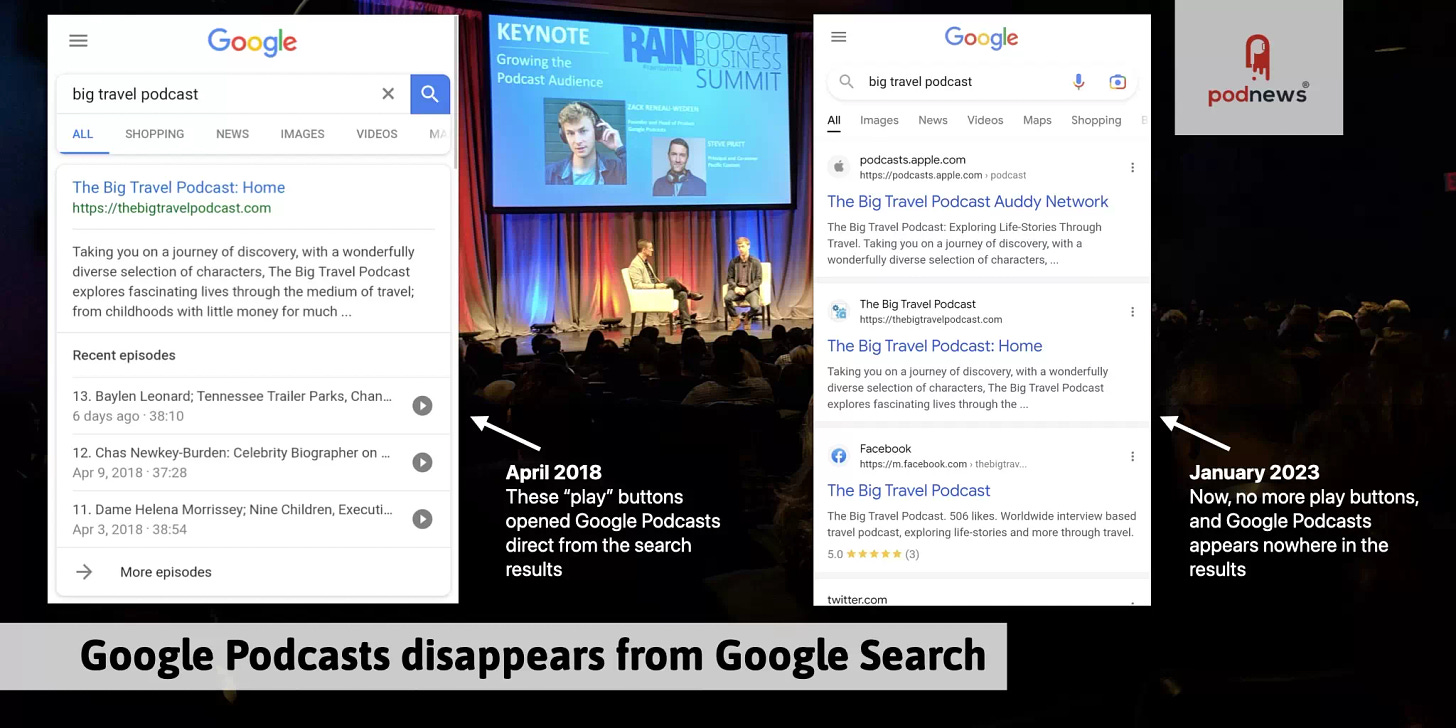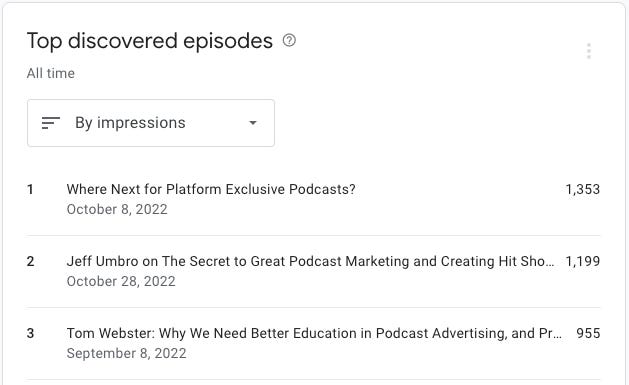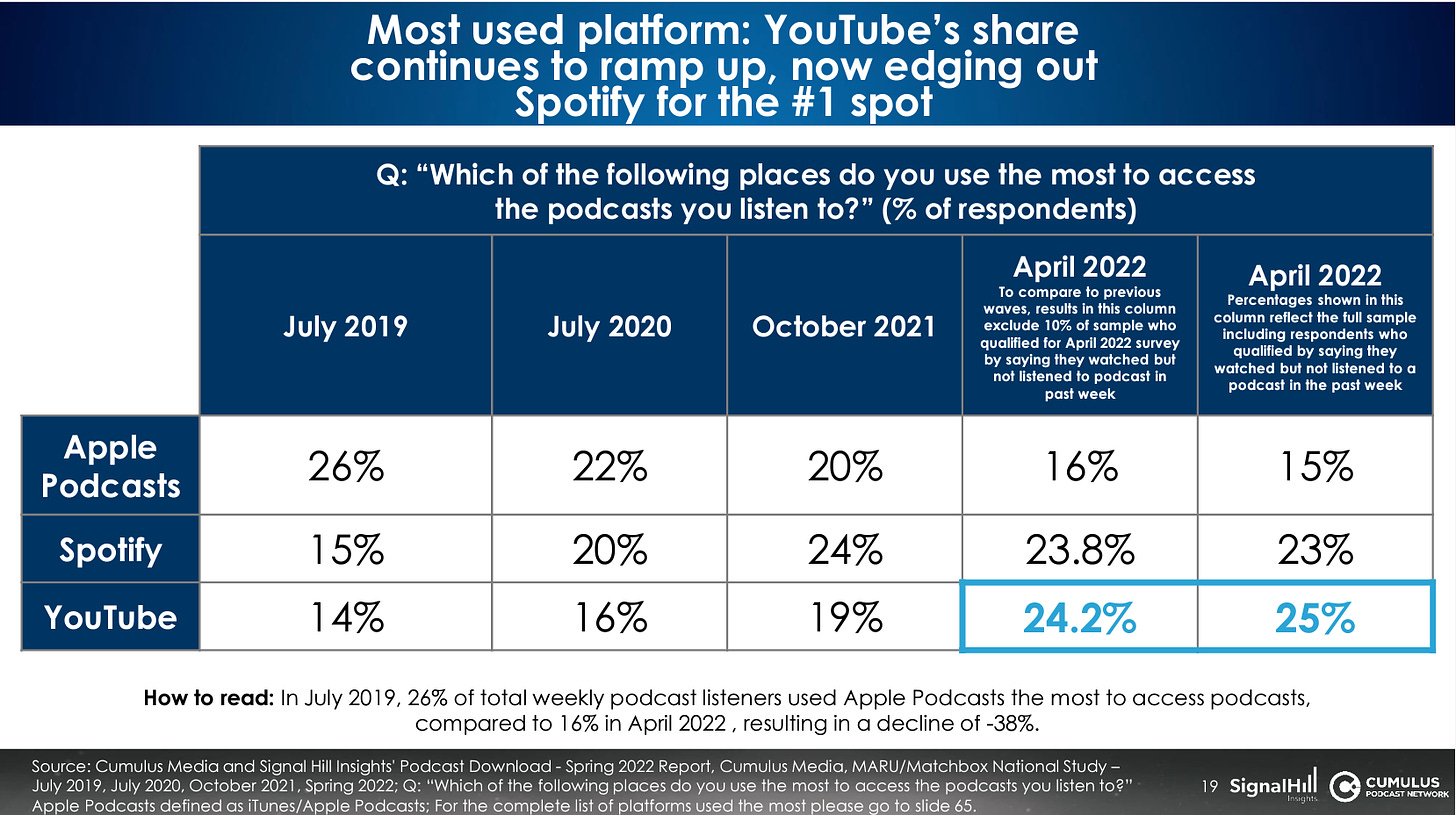Will Google Discontinue Google Podcasts?
or are they just planning for an audio/video convergence?
In the last few days, industry publication Podnews shared an update that Google had removed Google Podcast players from search results on their search engine.
As you can see from the image above, from the original Podnews story, previously when you searched for a podcast you would get playable podcast players from Google Podcasts, so you could listen to an episode directly from the search result.
Not only was this great for the user, since they can listen to an episode immediately, but it was great for the podcaster and encouraged more plays for their show.
However, that feature is now gone. Not only that, but the Google Podcasts platform itself also seems to have disappeared from search results. When I search for “Pod Chat” on Google, for example, I get the usual results of Apple Podcasts, my website, Spotify, Podnews, Deezer, etc., but nothing from Google Podcasts.
So, with the disappearance of both Google Podcast players and search results, does this mean Google is discontinuing their podcasts platform?
The Argument for Google Podcasts
While it may seem that Google could be setting up to sunset Google Podcasts, it’s probably too early to say if that’s an option they’re considering, especially when they only recently announced how YouTube is going to become a player in the podcasting space.
In March of 2022, Podnews shared details about an 84-page presentation of YouTube’s plans for podcasting and how it was going to support podcasters. This included using existing RSS feeds, and a dedicated homepage for podcasts on the channel (this is only available in the US at the moment).
YouTube also has a dedicated resource called Podcasting on YouTube, that explains why podcasters should bring their shows to YouTube, and how you can monetize through the platform.
So it would appear that podcasting is still very much a focus for Google (though maybe in a rebranded way - more on that in a bit).
Then there’s Google Podcasts Manager, a portal where you can add/claim your podcast and get additinal information around your podcast audience, something I covered in my One Minute Podcast Tips show.
Arguably, Google Podcasts Manager has something up its sleeve that other podcast portals don’t, and that’s its ability to integrate with Google’s search engine to provide really useful data on how listeners are finding your show on search, including keywords and clickthroughs.
This kind of information can really help podcasters tailor their content for the audience they want to attract, and make sure their show notes are fully optimized for search.
It’s for these reasons that Google Podcasts would seem to still have a future.
The Argument Against Google Podcasts
When news of YouTube’s entry into podcasting broke, there were a lot of online conversations on whether this meant Google Podcasts would be folded into YouTube, given the latter platform has wider name recognition and brand strength. And, to be fair, this would make sense, with almost 60% of listeners saying they prefer listening to podcasts in the background on YouTube in a study from last year.
We’re still waiting on YouTube’s full entry into podcasting, following the early tease last year when they made their initial announcement. By removing Google Podcasts from search, it could be YouTube is readying the way for Podcasts on YouTube as well as negating any possible confusion around the platform you should be publishing to/listening on.
Google also seems to be missing out when it comes to the preferences of what platform to use to listen to podcasts. In their Podcast Download Spring 2022 report, Cumulus Media and Signal Hill Insights shared the top three apps/platforms: YouTube, then Spotify, and then Apple Podcasts.
While Apple Podcasts and Spotify may be the more recognizable name when it comes to podcasting, the fact that YouTube has come in so strong can’t be ignored, and could well be the reason focus may be getting diverted away from Google Podcasts, and shifted to YouTube for Podcasting.
Perhaps a telling thought might come from this tweet from Neal Veglio:

Given Apple Podcasts is pre-installed on iPhones, and their desktop app for Mac is super easy to use, I always wondered why Google Podcasts wasn’t added by default to any Android phones, which would have given the platform a nice lift when it comes to Android users who are also podcast listeners.
Where Next for Google Podcasts?
At the minute, there’s nothing concrete around what comes next. James Cridland, editor of Podnews, advises he reached out to Google for comment, with the following answer.
“YouTube and Google Podcasts serve different needs. Both serve podcast listeners today and we are not changing this right now. We have nothing more to share at this time.” ~ source.
If Google Podcasts is sunsetted, it’d be a shame. While it may not have the bells and whistles of many of its counterparts, it’s a solid little podcast app that I use frequently, because of its clean UI and the fact it does all I need a podcast app to do - give me a library and an easy listening experience.
As mentioned earlier in this piece, it also provides some great info around your show if you’re a podcaster, and it’s the kind of info that you can use to make your show more searchable and stickier, which is always nice.
Some podcasters are suggesting it’s time for Apple to release a version of Apple Podcasts for Android.

And maybe this is an option, though there are already some great apps available on Android that have built up a large and loyal following.

That being said, YouTube has some of the best analytics around for its platform, which it can offer down to the way its ecosystem encourages stickiness and repeat use of YouTube by both viewers and creators. If they were to fold Google Podcasts into this, and make it super easy to publish an audio podcast to YouTube and perhaps use AI to insert contextual images and text to make the experience a little more visual, then Google Podcasts will have served its use and served it well.
It’ll be interesting to see what comes next.









Given the behind-the-scenes podcast activity at YouTube, it’s a safe guess that YouTube is the reason.